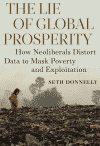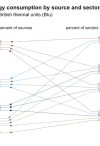Political Economy
 [PDF]-100x146.jpg)
In sheer quantity, household labor, including child care, constitutes a huge amount of socially necessary production. Nevertheless, in a society based on commodity production, it is not usually considered “real work” since it is outside of trade and the market place. This assignment of household work as the function of a special category women means that this group does stand in a different relation to production than the group men. Except for the very rich, who can hire someone to do it, there is for most women, an irreducible minimum of necessary labor involved in caring for home, husband, and children. Household work remains a matter of private production. | more…

Margaret Benston and the Political Economy of Women's Liberation
In the late 1960s, the North American women’s liberation movement was reaching a highpoint of activity, its militancy complemented by a flourishing literature. This was the environment into which Margaret Benston’s 1969 Monthly Review essay, “The Political Economy of Women’s Liberation,” struck like a lightning bolt. At the time, many in the movement were describing women’s situation in terms of sociological roles, functions, and structures—reproduction, socialization, psychology, sexuality, and the like. In contrast, Benston proposed an analysis in Marxist terms of women’s unpaid labor in the family household. In this way, she definitively shifted the framework for discussion of women’s oppression onto the terrain of Marxist political economy. | more…

Reflections on Feminism and Its Future
The question of the oppression of women, the critique of which constituted feminism as an academic and political pursuit, has been feminism’s enduring source of strength and appeal, yielding numerous critical theories and perspectives. This has produced continual conceptual shifts defining an evolving feminism, such as the shift from women to gender and from inequality to difference. It has also involved shifts from theorizing the general conditions of women’s experience—oppressed at home and in the workplace, while juggling the conflicting demands of both—to theorizing the implications of the claim that, while gender may be the main source of oppression for white, heterosexual, middle-class women, women with different characteristics and experiences are affected by other forms of oppression as well. A possible way for Marxist feminism to remain a distinctive theoretical and politically relevant perspective might be to return to class, in the Marxist sense, theoretically reexamining the relationship between class and oppression, particularly the oppression of working-class women, within capitalist social formations. | more…

The Political Economy of Women's Liberation
Margaret Benston’s “The Political Economy of Women’s Liberation” appears as both a return to the past and, at the same time, if not a “watershed,” as described by Peter Custers, certainly a new turn. On the one hand, she reiterated the classic Marxist-Leninist argument concerning the precapitalist, premarket character of domestic work. On the other, she so strongly insisted on the importance of this work for the stability and perpetuation of the capitalist system that she not only anticipated some of the theses later argued by theorists in the Wages for Housework Campaign, but often fell into apparent contradictions. | more…

Marge Piercy is the author of many books of poetry, most recently Made in Detroit. | more…

“We’re making headway on global poverty,” trills billionaire philanthropist Bill Gates. “Decline of Global Extreme Poverty Continues,” reports the World Bank. And “How did the global poverty rate halve in 20 years?” inquires The Economist magazine. Seth Donnelly answers: “It didn’t!” In fact, according to Donnelly’s The Lie of Global Prosperity, virtually nothing about these glad tidings proclaiming plummeting global poverty rates is true. | more…

Today, we not only have decades of neoliberalism behind us, but the neoliberal regime itself has reached a dead end. Contemporary imperialism has to be discussed within this setting. There are two main reasons why the regime of neoliberal globalization has run into a dead end. The first is an ex ante tendency toward global overproduction; the second is that the only possible counter to this tendency within the regime is the formation of asset-price bubbles, which cannot be conjured up at will and whose collapse, if they do appear, plunges the economy back into a crisis. In short, there are no “markets on tap,” to use the words of British economic historian Samuel Berrick Saul, for contemporary metropolitan capitalism, such as had been provided by colonialism prior to the First World War and by state expenditure in the post-Second World War period of dirigisme. | more…

During the 2018 Brazilian presidential elections, almost thirty years after the first democratic elections since the military dictatorship, Jair Bolsonaro took on the role of supposed underdog and, in the face of the collapse of the other center and right-wing bourgeois candidates, became the only one capable of countering the risk of the victory of the Workers’ Party. Bolsonaro, or the captain, as he is frequently called by his acolytes, is a sort of Donald Trump of the periphery—a second-rate Trump. Though he appears to be the most radical critic of the system, he is, in fact, the very image of the status quo, in all its brutality and rawness. | more…

Can economic growth continue forever? This relatively simple question has posed some intellectual headaches for modern capitalism. Capital cannot tolerate any limits—that is, the drive for growth and the search for new markets are both necessary for the political and economic survival of capitalism. Viewed in this light, the implications of the question present something of an existential challenge to the current order. Capitalism cannot acknowledge any natural limits to economic growth, for that would mean acknowledging its ultimate demise. To keep up the pretense that capitalism represents a quasi-eternal and invincible system, most political leaders and economists who support the current order have begun reciting a series of elaborate narratives about the relationship between human economies and the natural world. | more…

Although neoliberalism is widely recognized as the central political-ideological project of twenty-first-century capitalism, it is a term that is seldom uttered by those in power. Behind this particular ruse lies a deeply disturbing, even hellish, reality. Neoliberalism can be defined as an integrated ruling-class political-ideological project, associated with the rise of monopoly-finance capital, the principal strategic aim of which is to embed the state in capitalist market relations. Hence, the state’s traditional role in safeguarding social reproduction—if largely on capitalist-class terms—is now reduced solely to one of promoting capitalist reproduction. The goal is nothing less than the creation of an absolute capitalism. All of this serves to heighten the extreme human and ecological destructiveness that characterizes our time. | more…

In the Republic of Korea, chaebols—diversified and large-scale conglomerate forms of capital governed dynastically by an owner and the owner’s family—have grown quickly, dominating the Korean market and substantially contributing to the Korean economy since their structuring in the 1970s. Some chaebol affiliates have grown into global economic powers within a mere thirty to forty years. However, the fast growth of the chaebols in Korea has also been associated with crises and in trying to manage these crises chaebols have not only changed the ways in which they accumulate capital, they have sought to establish hegemony over civil society. | more…

In the Notes from the Editors of the January 2019 issue of Monthly Review, the editors commented on a blog post by Michael Roberts on the term financialization. In the first part of this short exchange Roberts questions whether financialization is a meaningful and useful term, or simply a distraction from a comprehensive critique contemporary capitalism. | more…
 [PDF]-100x146.jpg)










